
Highland County is a county located in the Commonwealth of Virginia. As of the 2010 census, the population was 2,321, in 2015, the population was estimated at 2,214. Its county seat is Monterey. Known as "Virginia's Switzerland" or "Virginia's Little Switzerland", Highland County is the least populous county in Virginia. Highland lays claim to being one of the least populous counties and one of the highest average elevations east of the Mississippi River.
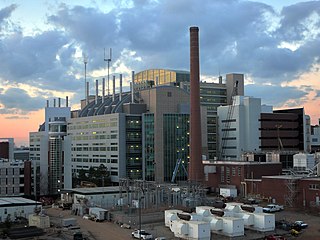
Druid Hills is a community which includes both a census-designated place (CDP) in unincorporated DeKalb County, Georgia, United States, as well as a neighborhood of the city of Atlanta. The CDP's population was 14,568 at the 2010 census. The CDP contains the main campus of Emory University and the Centers for Disease Control and Prevention (CDC). The Atlanta-city section of Druid Hills is one of Atlanta's most affluent neighborhoods with a mean household income in excess of $238,500.
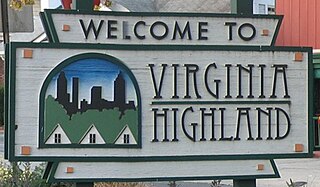
Virginia–Highland is an affluent suburb of Atlanta, Georgia, founded in the early 20th century as a streetcar suburb. It is named after the intersection of Virginia Avenue and North Highland Avenue, the heart of a busy commercial district at the center of the neighborhood. The neighborhood is famous for its bungalows and other historic houses from the 1910s to the 1930s. It has become a destination for people across Atlanta with its eclectic mix of restaurants, bars, and shops and for the Summerfest festival, annual Tour of Homes and other events.
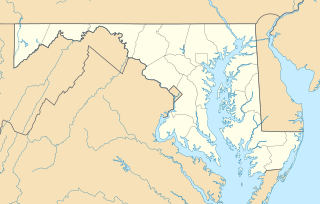
Highland is an unincorporated community and census-designated place in Howard County, Maryland, United States. As of the 2010 census it had a population of 1,034. It uses the 20777 zip code.

Ponce de Leon Avenue, often simply called Ponce, provides a link between Atlanta, Decatur, Clarkston, and Stone Mountain, Georgia. It was named for Ponce de Leon Springs, in turn from explorer Juan Ponce de León, but is not pronounced as in Spanish. Several grand and historic buildings are located on the avenue.

Morningside/Lenox Park is an intown neighborhood in Atlanta, Georgia founded in 1923. It is located north of Virginia-Highland, east of Ansley Park and west of Druid Hills. Approximately 3,500 households comprise the neighborhood that includes the original subdivisions of Morningside, Lenox Park, University Park, Noble Park, Johnson Estates and Hylan Park.
Okeley Manor was an early 19th-century plantation in Fairfax County, Virginia, United States. Okeley, the residence of prominent Alexandria physician Richard Chichester Mason (1793–1869), was one of the principal Mason family estates in Northern Virginia. Mason' plantation house was used as a hospital during the American Civil War and burned to prevent the spread of smallpox.
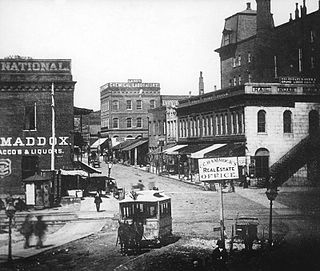
Streetcars originally operated in Atlanta downtown and into the surrounding areas from 1871 until the final line's closure in 1949.
David Rice, called "Father" David Rice and referred to by his contemporaries as the "Apostle to Kentucky," was a renowned antislavery Presbyterian minister during the antebellum era in the United States.

John Howell Memorial Park is a 2.8 acre park in the Virginia Highland neighborhood of Atlanta.

Asa Griggs "Buddy" Candler Jr. was the eccentric son of Asa Griggs Candler, co-founder of Coca-Cola. Candler Jr. helped build his father's business into an empire. He later became a real-estate developer, opening the Briarcliff Hotel at the corner of Ponce de Leon Avenue and N. Highland Ave. in Virginia Highland.
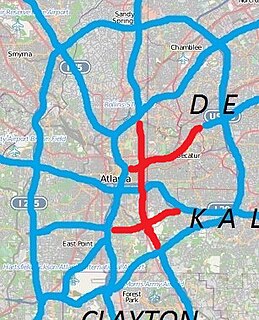
There have been multiple freeway revolts in Atlanta, Georgia. However, the longest and most famous example of Interstate opposition is against I-485 and the Stone Mountain Freeway through Intown Atlanta, lasting over 30 years, from the early 1960s until the final construction of Freedom Parkway on a small portion of the contested routes in 1994.

The Adair Mansion, originally named Wood Cliff (1895) is located in the Virginia Highland neighborhood of Atlanta, Georgia at 964 Rupley Drive, and is as of 2011 divided into upscale apartments.

Atlanta's mild climate and plentiful trees allow for festivals and events to take place in the city year-round. One of the city's most popular events is the Atlanta Dogwood Festival, an arts and crafts festival held in Piedmont Park each spring, when the native dogwoods are in bloom. Atlanta Streets Alive, inspired by the ciclovía in Bogotá, Colombia, closes city streets to car traffic to allow people to participate in health and community-oriented, such as bicycling, strolling, skating, people-watching, tango, yoga, hula hooping, and break dancing.
The History of Virginia–Highland, the Intown Atlanta neighborhood, dates back to 1812, when William Zachary bought and built a farm on 202.5 acres (0.819 km2) of land there. At some point between 1888 and 1890 the Nine-Mile Circle streetcar arrived,, making a loop of what are now Ponce de Leon Avenue, North Highland Avenue, Virginia Avenue, and Monroe Drive. Atlantans at first used the line to visit what was then countryside, including Ponce de Leon Springs, but the line also enabled later development in the area. Residential development began as early as 1893 on St. Charles and Greenwood Avenues, must most development took place from 1909 through 1926 — solidly upper-middle class neighborhoods, kept all-white by covenant.
The Virginia–Highland Tour of Homes is an annual two-day event each December in the Virginia–Highland neighborhood of Atlanta. During the event, houses around the neighborhood are opened to visitors. The Virginia–Highland Civic Association organizes the event.

Highland Avenue, east of the BeltLine North Highland Avenue, is a major thoroughfare in northeast Atlanta, forming a major business corridor connecting five Intown neighborhoods:
Leatherwood Plantation of 10,000 acres was located in Henry County, Virginia, where Patrick Henry lived from 1779 until 1784. The plantation is probably named after Leatherwood Creek, a tributary to the Smith River (Virginia), which ran through the property.













